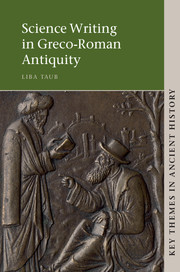We access Greek and Roman scientific ideas mainly through those texts which happen to survive. By concentrating only on the ideas conveyed, we may limit our understanding of the meaning of those ideas in their historical context. Through considering the diverse ways in which scientific ideas were communicated, in different types of texts, we can uncover otherwise hidden meanings and more fully comprehend the historical contexts in which those ideas were produced and shared, the aims of the authors and the expectations of ancient readers. Liba Taub explores the rich variety of formats used to discuss scientific, mathematical and technical subjects, from c.700 BCE to the sixth century CE. Each chapter concentrates on a particular genre - poetry, letter, encyclopaedia, commentary and biography - offering an introduction to Greek and Roman scientific ideas, while using a selection of ancient writings to focus on the ways in which we encounter them.
• Provides an innovative introduction to scientific ideas in the ancient Greek and Roman worlds • Introduces some unfamiliar examples of Greek and Roman writings about nature and mathematics • Reveals how much science and mathematics were connected to the broader culture of classical antiquity
Contents
Introduction; 1. Poetry; 2. Letter; 3. Encyclopaedia; 4. Commentary; 5. Biography; Conclusion; Bibliographical essay; Appendix 1: arithmetical epigrams from Book 14 of The Greek Anthology; Appendix 2: Eratosthenes' Letter to King Ptolemy.
Review
'Taub explores diverse genres of surviving texts in Greek and Roman science writing from antiquity: poetry, letters, encyclopedias, and commentaries. By considering the actual texts, as well as the ideas being conveyed and taught, the author is able to delve into ancient scholarly communication through a route of discovery that owes its insights to a fresh perspective, using representative extant texts as case studies to discuss the writers' motivations and ways of elucidating truth. … The narrative structure of this book reveals a fascinating unity of the ancients' scientific thought ('philosophy') while noting incomplete or contradictory evidence, with a nod to diversity in mentioning what little is known about the role of women in the scholarly record. The selected texts are situated in their historical context, providing an accessible yet challenging intellectual history for any individual interested in the history of science.' Choice


